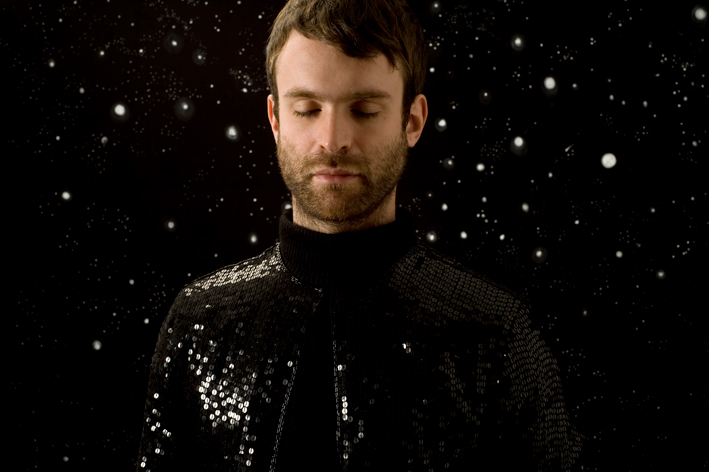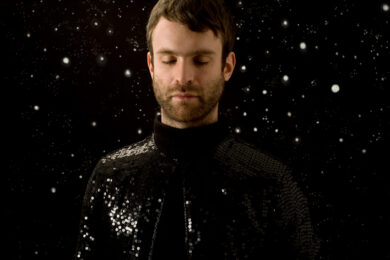Growing up to the hardcore rave sounds of the early nineties, Tim Exile’s first releases showcased a dark, aggressive drum ‘n’ bass aesthetic. But it was the live performances that made his a name to remember. In entirely improvised sets, he would loop and pitchshift his voice, bleed in synths and atmospheric samples, and layer it all up with gabba and techno beats. Tim Exile’s Nuisance Gabbaret Lounge captured that energy, a live recording of the DJ-cum-performer at his knob-twiddling best. So impressive was the software Exile had programmed for himself, he ended up doing development work for Native Instruments.
WARP – who celebrate their twentieth birthday this year – started to take notice, and are set to unleash his new album in April. Listening Tree steps away from Exile’s improv-electronica background. It’s more lyrical, more political and, dare I say it, more poppy. But the trademark Exile experimentation is still there, with enough glitchy beats and bleeps to keep the music-tech fraternity happy. The Quietus caught up with Tim on an untypically quiet week, just before a string of European concerts and festival appearances.
Where do you call home?
Tim Exile: “Well I moved to Berlin because I was finding the UK too much hard work, too much of a struggle. It was such a relief. There’s more social cohesion here, and more artistic opportunities – as a musician in England, you earn the square root of fuck all.”
Your new album Listening Tree is out next week – is it fair to say there’s a new emphasis on lyrics this time round?
TE: “Definitely, I haven’t really used vocal melodies on my past releases. There’s more of a message behind this one, it’s not just straight-up ear candy.”
What vocal influences lie behind this new sound?
TE: “I don’t own any pop CDs, so any influence there is pretty much second hand. The biggest inspiration actually comes from my school days, from singing in the choir.”
I’ve read that you disagree with electronic acts just playing back pre-recorded tracks on their laptops for ‘live’ sets. Where do you draw the line between live performer and DJ?
TE: “That used to frustrate me – my show used to be totally improvised, but I was always billed alongside artists with laptops who just tweaked stuff live. The difference between a ‘live’ and ‘DJ’ set is difficult to work out, I guess it’s more an issue of how you describe things. What’s the distinction between a covers band and a dj set? There are parallels there too. The best you can do is to find some arbitrary point to stand on the continuum. My point of view is not concrete.”
And has your point on the continuum shifted?
TE: “The last album was all live, and when I started work on the new one I felt that this pure real time improv thing I’d been into had run its course. I wanted to do something with a bit more substance, something beyond tweaking out sounds, and outside the IDM remit. There’s no way I could do these new songs live the way they appear on the album. So my new set will be half improvised, with the songs segued into it, I guess you could call it DJ karaoke.”
**You’ve done live-remix work with Micachu and a baroque orchestra. Are classical musicians really cut out for improvisation?”
TE: “They’re very used to instrumental precision and following precise instructions. How well they improvise seems to be down to personality and character rather than anything else. It’s not really a skill, it’s an openness to being ‘wrong’. That’s the whole thing with improvisation, sometimes it works better than others – but it’s never ‘wrong’.”
I saw your live mash-up of the Obama inauguration speech on YouTube. How did you feel about that as a historical moment?
TE: “Well, during the speech I was fairly concerned with technical issues! Obviously, it was a potentially pivotal moment – and aside from the political outcomes it was quite touching to see a nation roused by this big sense of hope. Whether or not that hope was misplaced is another question. But it was massively moving seeing people come together. There’s a big lack of togetherness in the world at the moment, particularly in England.”
So does politics have a place in your music?
TE: “It didn’t always. But living in this isolated, self-serving world, being a ‘musician’ wasn’t giving me what I wanted in a weird way. I didn’t just want to do it for the sake of ear-candy anymore. On this album, it was time for me to speak out.”
What’s your take on the state of the world today?
TE: “Well, this is the million dollar question…”
The trillion dollar question?
TE: “Ha, definitely. But all this stuff with the financial markets is the tip of the iceberg. It’s an analogy for what’s happening in the wider economy, and in the ecosystem. When it comes to the environment, we don’t have the liberty of printing money. We’ve all been part of this pyramid scheme that demands an infinitely big planet, but I think we’ve reached its maximum potential.”



